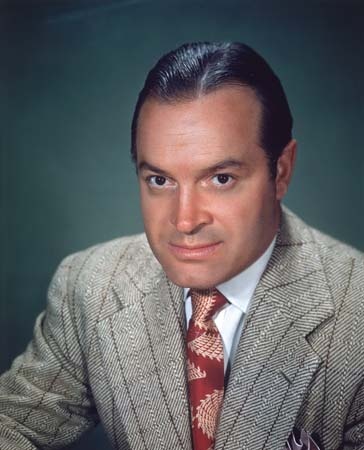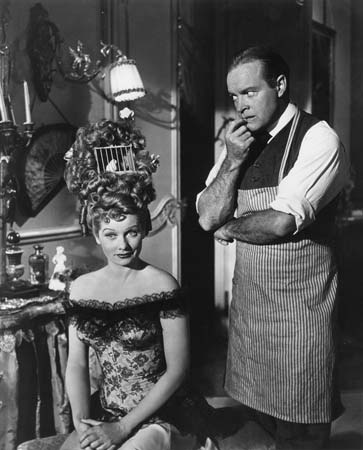Hope, Bob
American actor and entertainer
original name Leslie Townes Hope
born May 29, 1903, Eltham, near London, England
died July 27, 2003, Toluca Lake, California, U.S.
 British-born American entertainer and comic actor, known for his rapid-fire delivery of jokes and one-liners and for his success in virtually all entertainment media. He was also known for his decades of overseas tours to entertain American troops, and he received numerous awards and honours for his work as an entertainer and humanitarian.
British-born American entertainer and comic actor, known for his rapid-fire delivery of jokes and one-liners and for his success in virtually all entertainment media. He was also known for his decades of overseas tours to entertain American troops, and he received numerous awards and honours for his work as an entertainer and humanitarian.Hope was the fifth of seven sons of a stonemason and a former Welsh concert singer; his family immigrated to the United States when he was four years old. He grew up in Cleveland, Ohio, manifesting the first signs of his vocation at age 10 when he won a Charlie Chaplin (Chaplin, Charlie) imitation contest. After a series of odd jobs, including amateur boxer, Hope during his late teens embarked on an entertainment career and later performed with a succession of partners in vaudeville. He first appeared on Broadway in The Sidewalks of New York (1927), and after additional work in vaudeville and a failed Hollywood screen test, he landed his first substantial stage role in the Jerome Kern (Kern, Jerome) musical Roberta (1933). During the mid-1930s he starred in a series of comedy shorts and found increasing success in radio, a medium well-suited to his loquacious style. Hope made his feature-film debut in The Big Broadcast of 1938 (1938), in which he first sang his signature tune "Thanks for the Memory," and he launched the long-running The Bob Hope Show on radio in that same year. By the end of the decade, Hope was one of America's most popular comics.
Just as silent films had popularized physical and slapstick comedy, the encroachment of sound motion pictures and radio during the 1930s paved the way for Hope's style of brash verbal comedy. Although a bug-eyed double take is a familiar Hope trademark, most of his comedy relied on quips and wisecracks delivered at a breakneck pace. His persona was that of transparent bravado, glib repartee, and ingratiating mediocrity—a smart aleck who cowers at the slightest threat. He did not elicit audience sympathy and was less likely to win the girl at the end of a film than he was to wind up the buffoonish victim of some quagmire of his own making. By allowing the audience to feel superior to him, Hope was one of the few comic performers to sustain a successful career built upon a largely unsympathetic character.
 The first films to showcase Hope's familiar persona were The Cat and the Canary (1939) and The Ghost Breakers (1940), two horror-film spoofs that costarred Paulette Goddard (Goddard, Paulette). In 1940 Hope made Road to Singapore, the first of seven popular “Road” pictures in which he costarred with Bing Crosby (Crosby, Bing) and Dorothy Lamour. Characterized by lighthearted irreverence, absurd sight gags, and an abundance of in-jokes, the “Road” pictures embody the brazen style of comedy in vogue during the 1940s. The films, of which Road to Morocco (1942) and Road to Utopia (1946) are usually cited as the best in the series, also contributed to Hope's status as one of America's top box-office draws during the years 1941–53. His other successful films from this period include My Favorite Blonde (1942), Let's Face It (1943), Monsieur Beaucaire (1946), Where There's Life (1947), My Favorite Brunette (1947), The Paleface (1948), Fancy Pants (1950), The Lemon Drop Kid (1951), and Son of Paleface (1952). Several films also showcased Hope's skills as a song-and-dance man and afforded him the opportunity to introduce many songs that became popular standards, including "Two Sleepy People," "Buttons and Bows," and "Silver Bells."
The first films to showcase Hope's familiar persona were The Cat and the Canary (1939) and The Ghost Breakers (1940), two horror-film spoofs that costarred Paulette Goddard (Goddard, Paulette). In 1940 Hope made Road to Singapore, the first of seven popular “Road” pictures in which he costarred with Bing Crosby (Crosby, Bing) and Dorothy Lamour. Characterized by lighthearted irreverence, absurd sight gags, and an abundance of in-jokes, the “Road” pictures embody the brazen style of comedy in vogue during the 1940s. The films, of which Road to Morocco (1942) and Road to Utopia (1946) are usually cited as the best in the series, also contributed to Hope's status as one of America's top box-office draws during the years 1941–53. His other successful films from this period include My Favorite Blonde (1942), Let's Face It (1943), Monsieur Beaucaire (1946), Where There's Life (1947), My Favorite Brunette (1947), The Paleface (1948), Fancy Pants (1950), The Lemon Drop Kid (1951), and Son of Paleface (1952). Several films also showcased Hope's skills as a song-and-dance man and afforded him the opportunity to introduce many songs that became popular standards, including "Two Sleepy People," "Buttons and Bows," and "Silver Bells." During World War II Hope traveled extensively to entertain troops overseas and at home; most of his war-era radio shows were broadcast from military bases throughout the world. Because of his similar tours during American military involvement in Korea, Vietnam, and the Persian Gulf over subsequent decades, Hope became as renowned for his armed forces shows as for his accomplishments as an entertainer. In 1997 the U.S. Congress recognized his efforts by naming him the first “Honorary Veteran” in U.S. history. Hope, the most decorated American entertainer of all time, called it “the greatest honor I have ever received.” His other honours and awards include an honorary Commander of the Order of the British Empire, an honorary British knighthood, the Congressional Gold Medal, the Presidential Medal of Freedom, and five special Oscars for humanitarian services and contributions to the film industry.
Awards notwithstanding, Hope endured harsh criticism throughout his career both for his politics and for his reluctance to challenge himself as a performer. As his films became increasingly tired and formulaic in the 1960s, so too did his hawkish politics become out of sync with the American mood during the Vietnam War era. Young Americans, unfamiliar with the glib, wisecracking Hope of the 1940s films, now derided him as the embodiment of the “Establishment.” He was probably seen at his best during these years in live performance, where, free from the need to be topical, he could deliver a largely spontaneous show built around the vast mental warehouse of jokes that he had compiled over the decades.
By the late 1970s, Hope's status as a major comic was restored somewhat by prominent critics and directors (such as Woody Allen (Allen, Woody)) who lavished praise upon his films of the 1940s and early '50s. To his harshest critics, Hope will probably remain little more than a capable mouthpiece for his staff of comedy writers; to admirers, he represents a vital component in American comedy history and personifies the comic tastes of the World War II generation, by whom wit and wordplay were highly valued. At the close of the 20th century, Hope, who continued to perform on a limited basis into his 90s, was named entertainer of the century by several periodicals and organizations. A true American icon, Hope was perhaps the only entertainer to achieve front-line success in all the major entertainment media—stage, movies, radio, and television.
Additional Reading
Charles Thompson, Bob Hope: Portrait of a Superstar (1981); Leonard Pitts, Bob Hope (1984); Randall J. Mielke, Road to the Box Office: The Seven Film Comedies of Bing Crosby, Bob Hope, and Dorothy Lamour, 1940–1962 (1997); Lawrence J. Quirk, Bob Hope: The Road Well-Traveled (1998).
- Mitchell, R.J.
- Mitchell, Sir Thomas Livingstone
- Mitchell, S. Weir
- Mitchell, Wesley C.
- Mitchell, William
- Mitchell, W.O.
- Mitch, Hurricane
- Mitchum, Robert
- mite
- Mitford, Jessica
- Mitford, Mary Russell
- Mitford, Nancy
- mithan
- Mithra
- Mithradates I
- Mithradates II
- Mithradates VI Eupator
- Mithraism
- Mitiaro
- miticide
- Mitla
- Mitnagged
- Mito
- Mitochondrial respiratory chain disorders
- mitochondrion